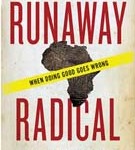Recently, I’ve been reading more and more about the Early Church Fathers and their views on the Atonement. A theme that arises in their writing is the theme of ontological consequences. Sin is inherently about ontological consequences, state-of-being consequences. It is alienation from who we are, from relationship, from who we were created to be. Salvation is about ontological healing: that which begins now and that which is yet to come.
If there is anything that Mad Men shows us, it is that sin leads to ontological brokenness. Sin makes a person lost, alienated from themselves, from God, from others.
Derek Flood writes about “Substitutionary atonement and the Church Fathers” and addresses the views of Athanasius:
… the model Athanasius has is one of natural consequence. In breaking our communion with God, Athanasius says that we have cut ourselves off from the very source of Life. As a result we return to the state we were created out of: nothing, ‘returning, through corruption, to non-existence again’ (ch 4). Being separated from the source of Life, we die. … Consequently, because Athanasius does not see sin as simply a transgression of the law, but involving a sickness of the soul, he says that repentance was not enough. ‘Had it been a case of a trespass only, and not of a subsequent corruption, repentance would have been well enough” (147).
Later, Flood writes similarly of Augustine:
… because Augustine’s view of human sin was so grave, he does not conceptualize of it merely as a crime to be remitted, but as a grave wound to be healed. ‘Relieve a deep wound after Your great healing. Deep is what I have, but in the Almighty I take refuge. Of my own so deadly wound I should despair, unless I could find so great a Physician! (157).
The power of art like Mad Men is that it amplifies truth about the human condition. It makes visible that to which we often desensitize ourselves to in the course of day-to-day life. While we may not all cheat on our spouses or suffer inner despair, if we look steadily at Don Draper’s character, surely there are things that resonate. There are ways in which we fail to live up to our own ideals, our own goals, our own internal morals. There is the creeping dismay at approaching death, that inescapable reality. There is the search for relevance. There is the lingering pull of past relational wounds that have damaged us to our core. With Don Draper and the Apostle Paul, we bemoan the limitations of our humanity–a beautiful humanity, but a broken humanity, and we cry out, bewildered:
I do not understand my own actions. For I do not do what I want, but I do the very thing I hate.–Romans 7:15 (NRSV)

Last night’s episode, “Severance,” showed us all of this. As the episode opened, we saw a woman in a lush fur coat, Don’s voice telling her she deserves all this, asking her to provocatively let the coat slide down past her bare shoulder, telling her to display her beautiful leg on a chair. A ravishingly sexy woman, young, desperate for approval, willing to do anything to get it. We think she is another of Don’s girlfriends. The camera has panned out and shown him standing by the window watching her, with too much detachment, we think. She is surely his latest attempt to visit the fountain of youth and be healed. And then the camera pans still further out, and we see the other ad men. This is not Don’s latest fling. This is a casting call. It seemed real, but it was actually completely fake. Just like all of the empty ways Don has tried to heal his soul.
To a man who doesn’t know how to treasure a beautiful woman, rather than use her to heal himself, the nectar of her love becomes nothing but poison. To each of us, when we don’t appreciate and appropriate the gifts of creation within their proper space, neither denigrating them or elevating them overly much, we find ourselves in slavery instead of freedom.
When I watch Mad Men, I think about a lot about my own propensity to self-destructive behavior. I think about my own slavery to sin. And lately, I think about my need for ontological healing. I’m a Christian. I believe Jesus has begun this work of healing in my life. But I also believe, with the Apostle Paul, that creation is still in the process of “groaning,” as if in childbirth. It is groaning and longing for new life to come about fully, once and for all.
We know that the whole creation has been groaning in labor pains until now; and not only the creation, but we ourselves, who have the first fruits of the Spirit, groan inwardly while we wait for adoption, the redemption of our bodies.–Romans 8:22-23
I thank God that the ontological emptiness I see in Don Draper, in creation, in my own self-defeating moments is not the end. I thank God there is a Great Physician, Jesus Christ. And He will bring healing–to me and to this whole old world.
——————-
Community discussion guidelines:
Because this is a Christian blog, the things I’m talking about will obviously be topics that people feel strongly about in one direction or another. Please keep in mind that this is a place for substantive, respectful conversation. All perspectives are welcome to discuss here as long as all can treat each other with kindness and respect. Please ignore trolls, refuse to engage in personal attacks, and observe the comment policy listed on the right side of the page. Comments that violate these guidelines may be deleted. For those who clearly violate these policies repeatedly, my policy is to issue a warning which, if not regarded, may lead to blacklisting. This is not about censorship, but about creating a healthy, respectful environment for discussion.
P.S. Please also note that I am not a scientist, but a person with expertise in theology and the arts. While I am very interested in the relationship between science and faith, I do not believe I personally will be able to adequately address the many questions that inevitably come up related to science and religion. I encourage you to seek out the writings of theistic or Christian scientists to help with those discussions.
———————-
Photo source: IMDB.com.












